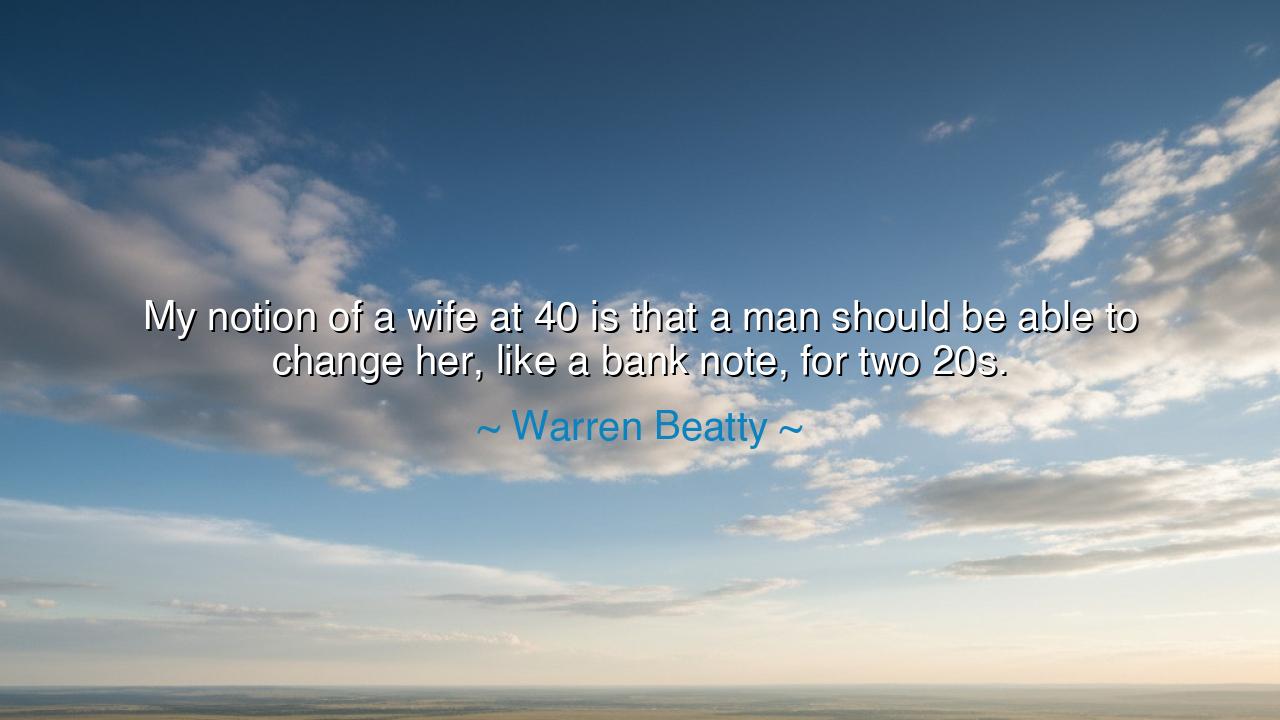
My notion of a wife at 40 is that a man should be able to change
My notion of a wife at 40 is that a man should be able to change her, like a bank note, for two 20s.






"My notion of a wife at 40 is that a man should be able to change her, like a bank note, for two 20s." - Warren Beatty. These words, though delivered with the sharp humor for which Beatty is known, carry a deep and complex reflection on the nature of relationships, especially in the context of age and the shifting dynamics between men and women. What Beatty suggests, in his own provocative way, is that by the time a woman reaches 40, she is somehow less valuable or desirable in the eyes of some men, much like a bank note that can be easily exchanged for something more youthful and idealized. This sentiment speaks to a broader societal attitude toward women, one that often measures their worth through their appearance and youth, rather than their experience and wisdom.
In ancient cultures, the concept of aging and beauty was similarly entwined with a woman’s value in society. The Greeks and Romans, though they revered the wisdom that came with age, often saw youth and beauty as the highest forms of value for a woman. The goddess Aphrodite, born from the sea foam, was not only the goddess of love and beauty but a symbol of the eternal youth that many women of her time aspired to. Her beauty was her power, and many stories from these ancient cultures reflect a belief that as beauty faded, so too did a woman’s influence or relevance. In this way, Beatty’s words reflect an ancient truth, though presented with a modern, cynical twist.
However, in this bleak view, there lies a contradiction: the wisdom and strength that come with age are often overlooked in favor of superficial beauty. Take, for example, the life of Queen Elizabeth I, who, despite growing older, retained immense power and respect as she led England through a golden age of exploration and culture. Elizabeth was well into her middle years when she made some of her greatest contributions to her country, yet the world still viewed her through the lens of beauty and virility, often diminishing her influence by her age. In her case, her strength, intellect, and political acumen were her true power, not the illusion of youth that men like Beatty may have valued.
The truth in Beatty’s words, then, lies in the recognition of how society often reduces a woman to youthful beauty rather than acknowledging her full self. But it also points to a truth that many men, especially as they age, may seek the vibrancy of youth over the richness of experience that comes with age. This is not just a societal view, but a psychological one. As men grow older, they may look to recapture the energy of their younger years through the women they are with, finding it difficult to accept the natural progression of time in themselves or others.
But let us look beyond the humor and examine the lesson inherent in Beatty’s quote. What if we were to reject the idea that a woman’s value diminishes with age and instead embraced the idea that she is like a fine wine, growing richer, stronger, and more complex with time? Socrates, that great philosopher of ancient Greece, spoke of the importance of virtue over appearance, urging individuals to focus on the development of their character rather than their physical form. His teachings emphasized that the true value of a person, particularly in older age, lies in the wisdom and integrity they carry, not in the superficial aspects that youth prizes.
The practical lesson here is one of embracing the passage of time with dignity and strength, and understanding that true worth is not something that diminishes as we age. Instead, we should foster relationships that honor the depth of experience and the wisdom that grows with age. Whether you are a man or a woman, growth does not come through clinging to youth, but by recognizing the power that comes from living a full life, embracing both the joys and struggles that have shaped you. As you move through the years, let your relationships be based not on youthful beauty, but on the strength of character and the richness of shared experience.
Thus, in Warren Beatty’s remark lies a critique of the superficial judgments we make about one another based on age, appearance, and societal norms. We must challenge these views and instead celebrate the depth, wisdom, and beauty that come with age. Let us not exchange our true selves for the fleeting allure of youth or superficial beauty, but embrace the richness that comes from a life well-lived, one that is marked not by outer appearances, but by the depth of our character, the strength of our spirit, and the joy of wisdom shared.






AAdministratorAdministrator
Welcome, honored guests. Please leave a comment, we will respond soon